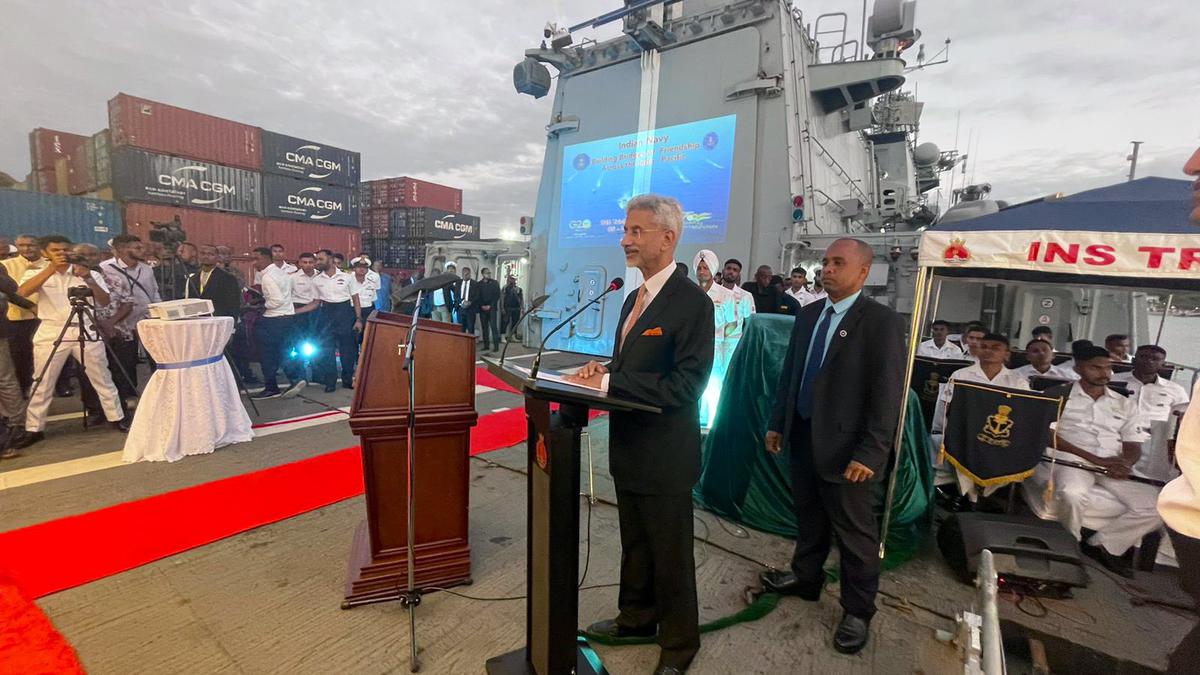
EAM Jaishankar attends reception onboard INS Trishul along with Zanzibar President
The Hindu
External Affairs Minister S. Jaishankar attend a deck reception onboard INS Trishul along with President of Zanzibar Dr. Hussein Ali Mwinyi and said that the presence of the ship here is a statement of India’s commitment to ensure peace and prosperity in the region.
External Affairs Minister S. Jaishankar attend a deck reception onboard INS Trishul along with President of Zanzibar Dr. Hussein Ali Mwinyi and said that the presence of the ship here is a statement of India's commitment to ensure peace and prosperity in the region.
The Indian Naval Ship Trishul, a guided missile frigate, is visiting Tanzania.
Mr. Jaishankar arrived in Zanzibar on a two-day official visit on July 5. He called on President Mwinyi earlier and discussed bilateral ties, including defence cooperation.
"Delighted to meet President of Zanzibar Dr Hussein Ali Mwinyi. Appreciated his strong commitment to a stronger India-Zanzibar partnership. Our development partnership and defence cooperation are domains with which he is closely associated. @DrHmwinyi," the External Affairs Minister tweeted.
"Attended a deck reception hosted onboard INS Trishul with the President of Zanzibar@DrHmwinyi. Welcomed the presence of the Speaker, Ministers, MPs, and senior officers from the Tanzanian Defence Forces and the Indian diaspora. INS Trishul’s presence in Zanzibar today is a statement of our SAGAR commitment," Mr. Jaishankar tweeted on July 5.
SAGAR or Security And Growth for All in the Region is a maritime initiative that prioritises the Indian Ocean region to ensure India's peace, stability, and prosperity in the Indian Ocean region.
While speaking at the reception in the presence of the President of Zanzibar onboard INS Trishul, Mr. Jaishanakr said," The link between the western coast of India and the eastern coast of Africa, I think it's a very historical one. And today we have an opportunity to celebrate and again this is also a time when we strengthen our development partnership." "It's our focus to expand and deepen development, at the end of the day, development is underpinned by security and the presence today of an Indian Navy ship," he said.

“Writing, in general, is a very solitary process,” says Yauvanika Chopra, Associate Director at The New India Foundation (NIF), which, earlier this year, announced the 12th edition of its NIF Book Fellowships for research and scholarship about Indian history after Independence. While authors, in general, are built for it, it can still get very lonely, says Chopra, pointing out that the fellowship’s community support is as valuable as the monetary benefits it offers. “There is a solid community of NIF fellows, trustees, language experts, jury members, all of whom are incredibly competent,” she says. “They really help make authors feel supported from manuscript to publication, so you never feel like you’re struggling through isolation.”

Several principals of government and private schools in Delhi on Tuesday said the Directorate of Education (DoE) circular from a day earlier, directing schools to conduct classes in ‘hybrid’ mode, had caused confusion regarding day-to-day operations as they did not know how many students would return to school from Wednesday and how would teachers instruct in two modes — online and in person — at once. The DoE circular on Monday had also stated that the option to “exercise online mode of education, wherever available, shall vest with the students and their guardians”. Several schoolteachers also expressed confusion regarding the DoE order. A government schoolteacher said he was unsure of how to cope with the resumption of physical classes, given that the order directing government offices to ensure that 50% of the employees work from home is still in place. On Monday, the Commission for Air Quality Management in the National Capital Region and Adjoining Areas (CAQM) had, on the orders of the Supreme Court, directed schools in Delhi-NCR to shift classes to the hybrid mode, following which the DoE had issued the circular. The court had urged the Centre’s pollution watchdog to consider restarting physical classes due to many students missing out on the mid-day meals and lacking the necessary means to attend classes online. The CAQM had, on November 20, asked schools in Delhi-NCR to shift to the online mode of teaching.









